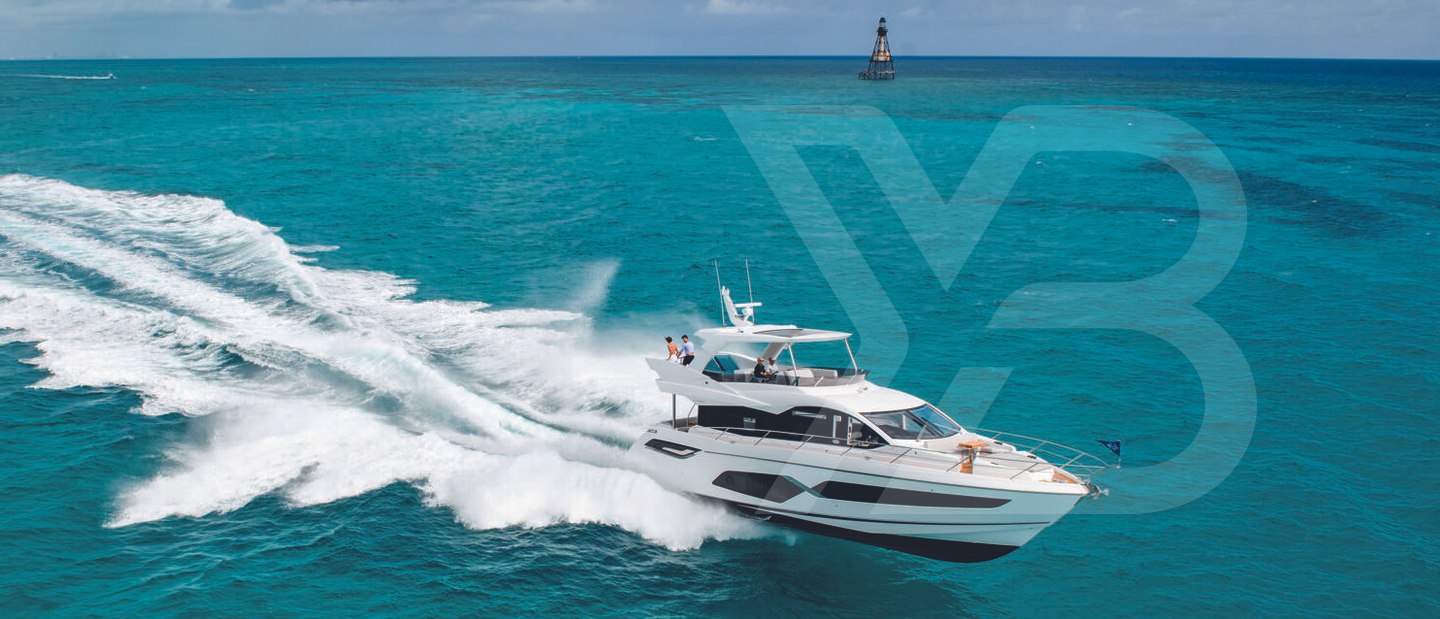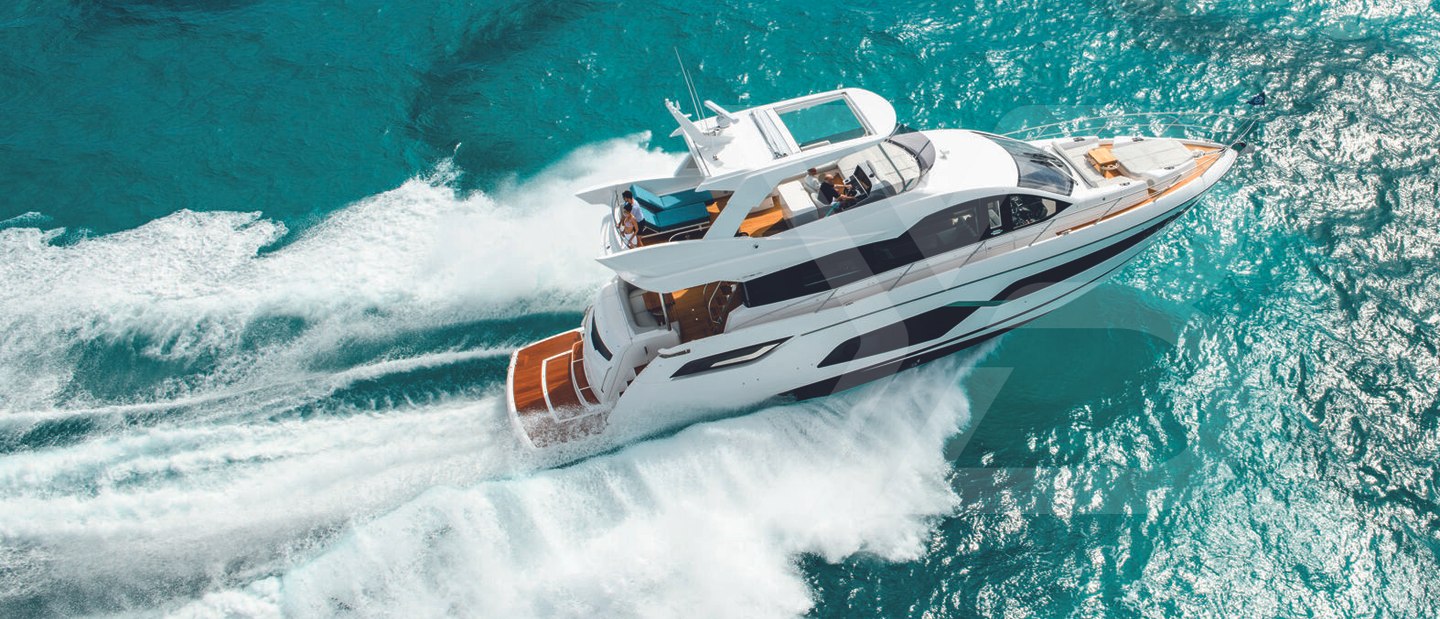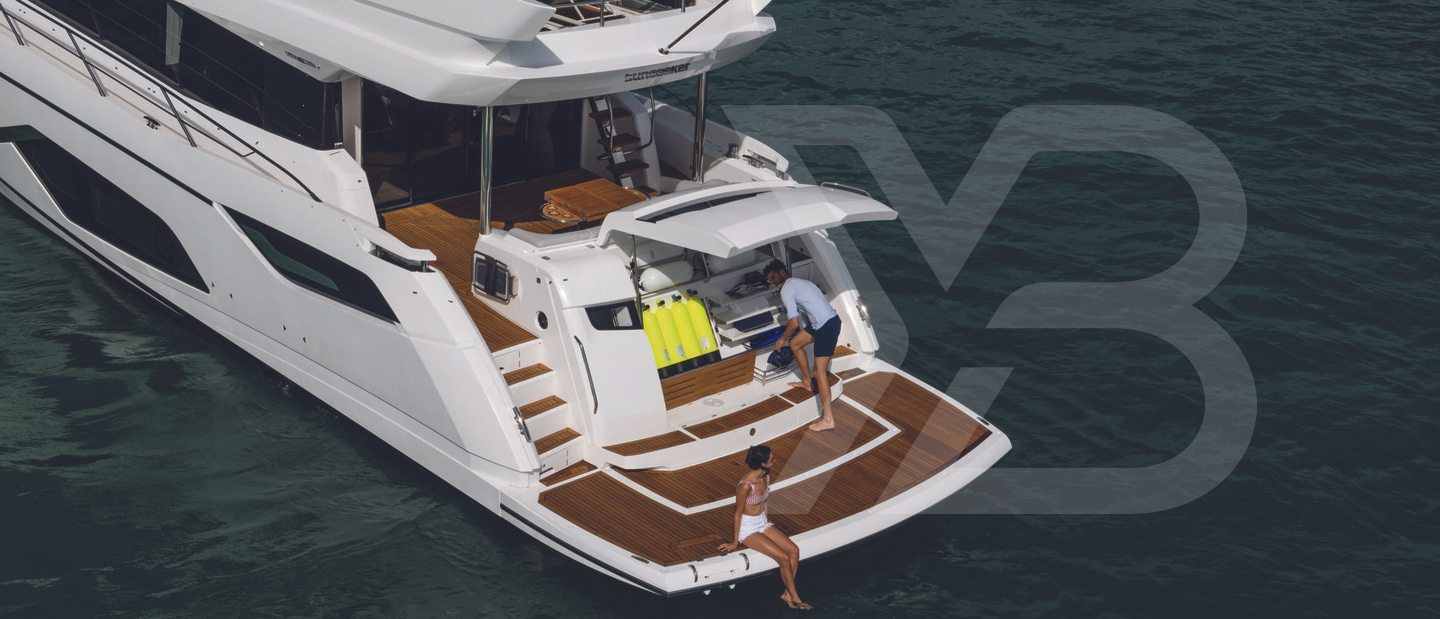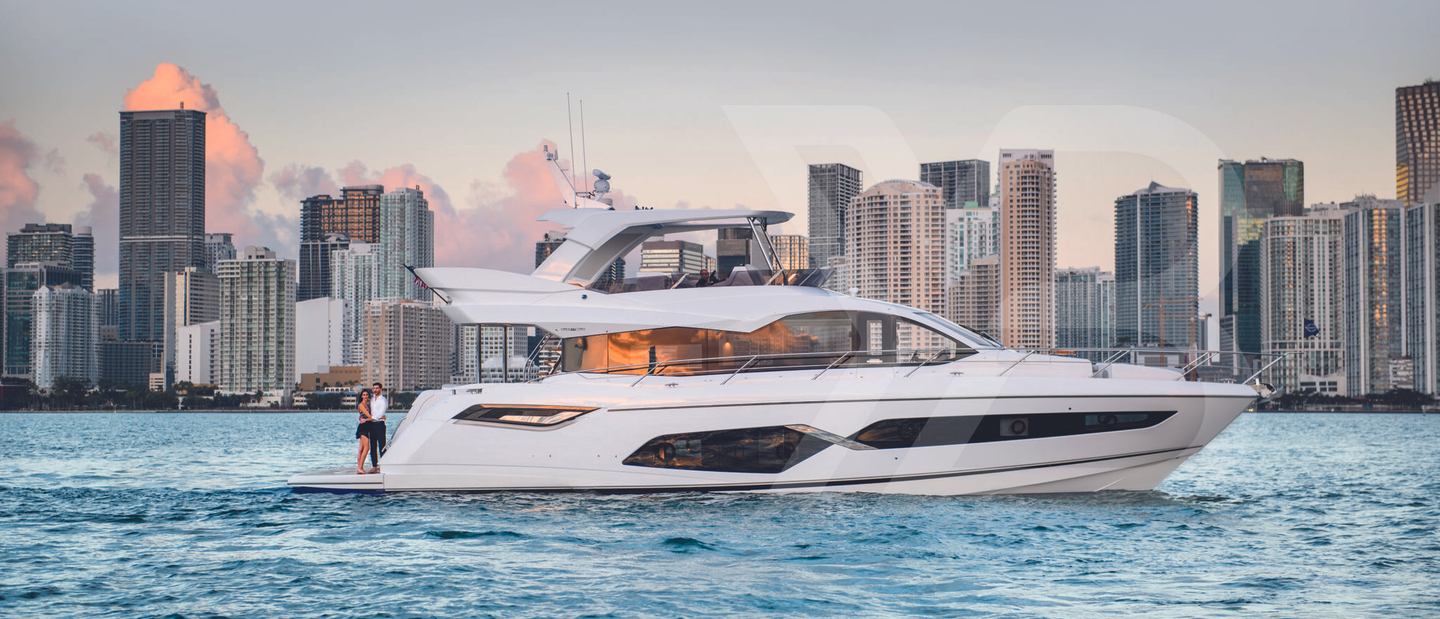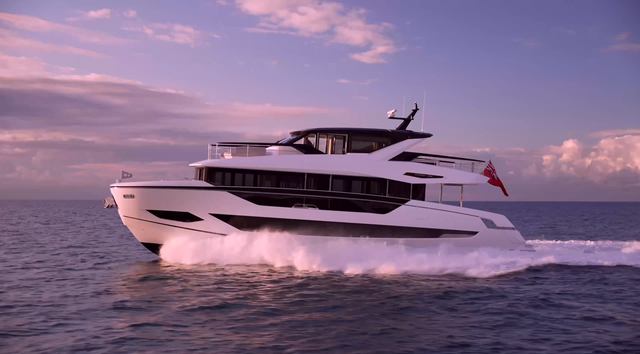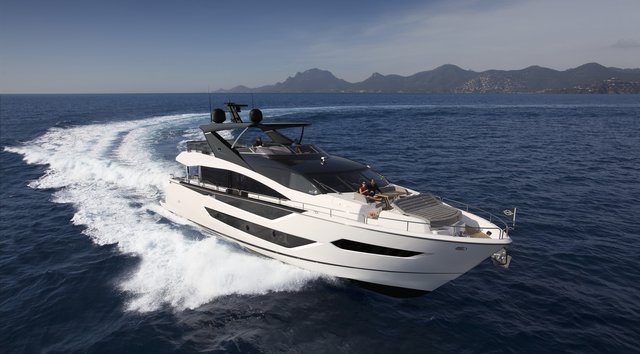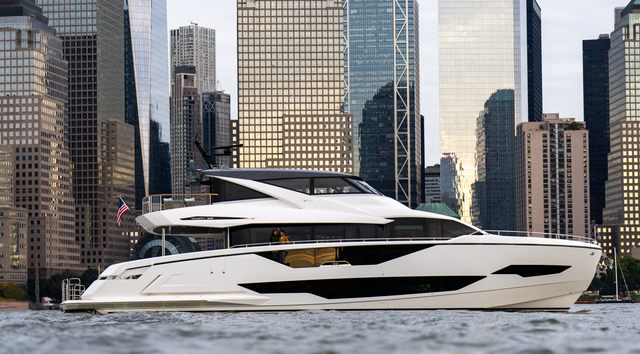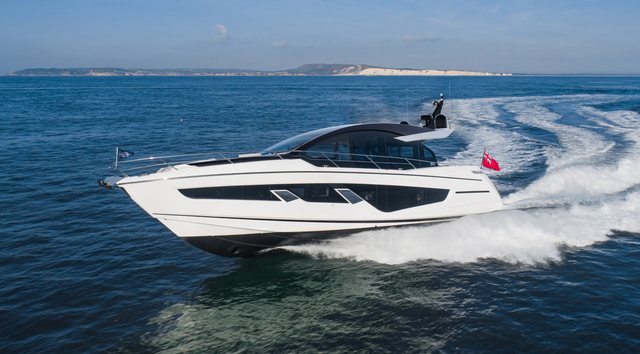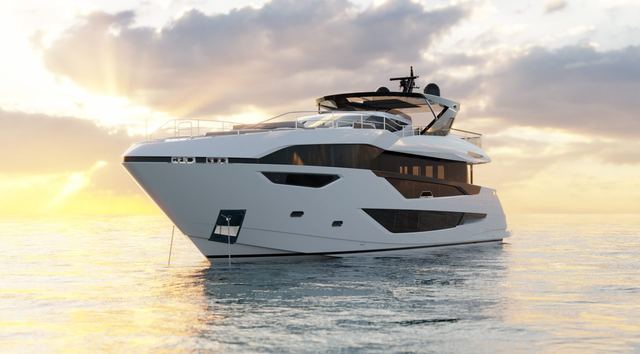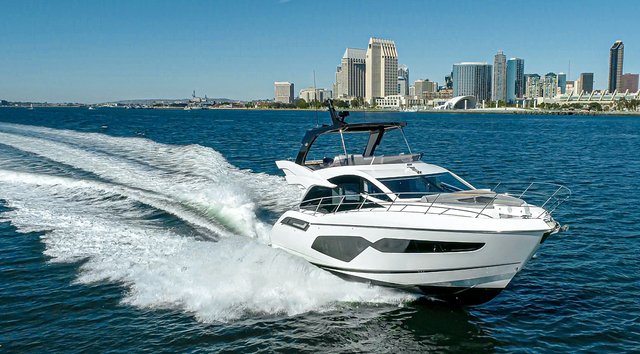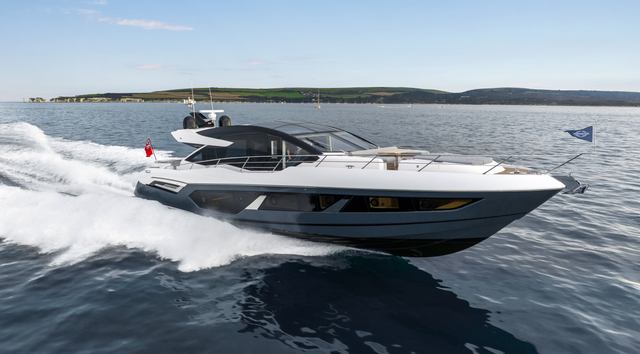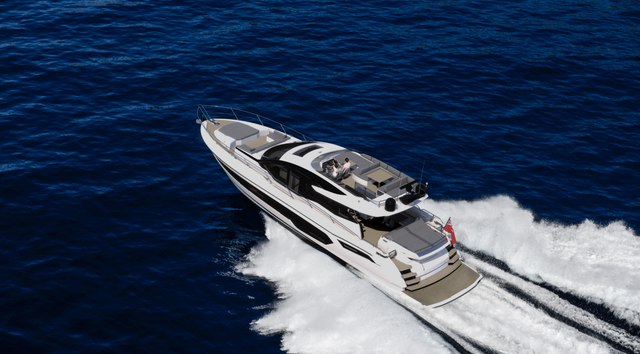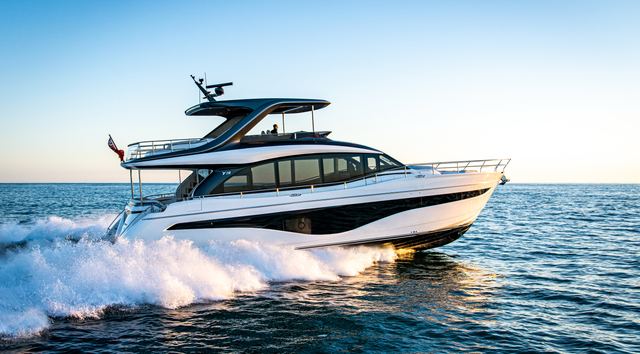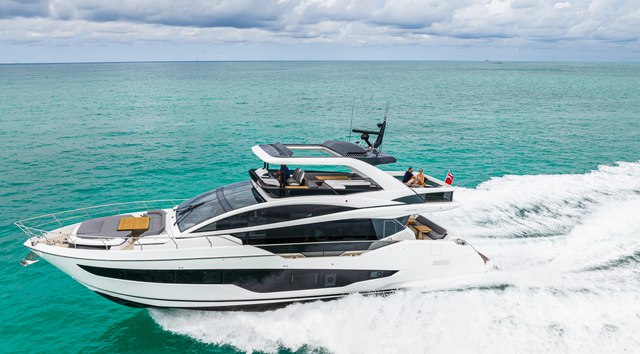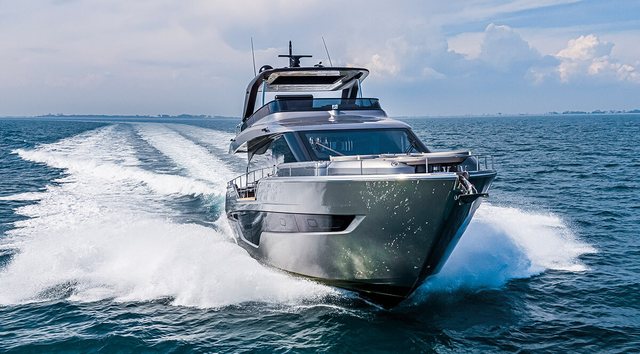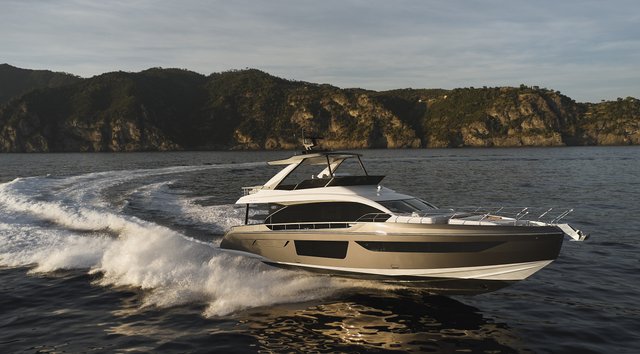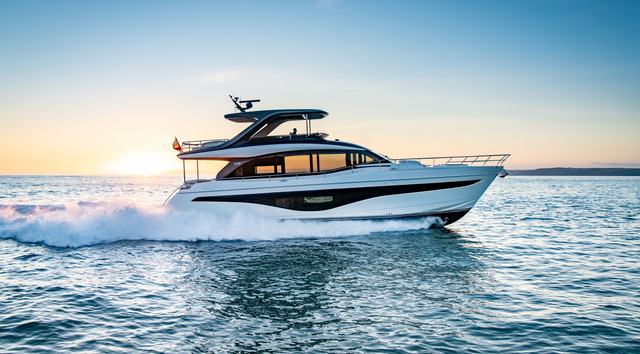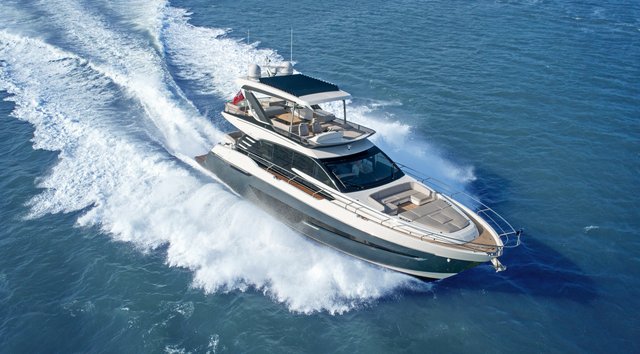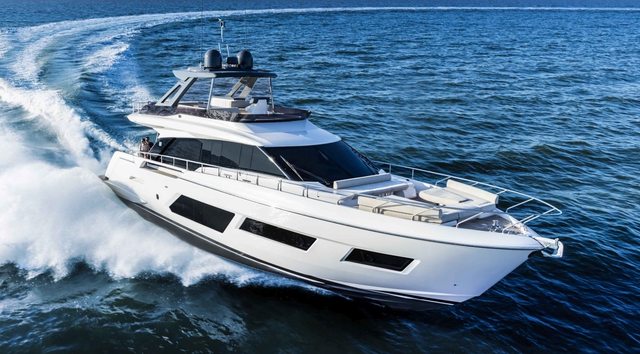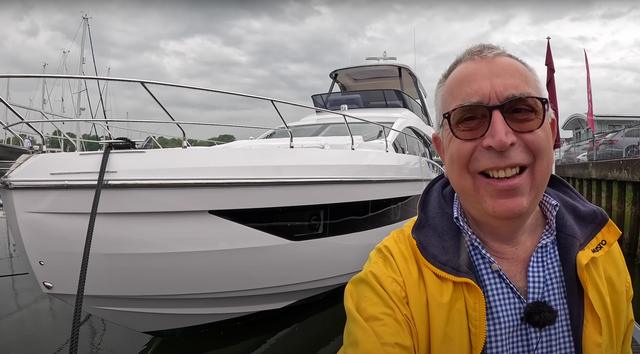The Manhattan 68 builds upon the success of its predecessor, the 66, maintaining its powerful, four-cabin, 30-knot flybridge format while incorporating subtle updates on deck and significant changes inside.
It introduces the latest interior and deck finishes seen across the Sunseeker range, offering depth, attention to detail, and numerous buyer-friendly options. This ensures the Manhattan 68 delivers the exceptional performance and luxurious experience expected from Sunseeker's renowned line of yachts.
Sunseeker is renowned for delivering big, powerful, flybridge-style yachts. With a legacy spanning 50 years, the British builder made a bold statement in the market about 15 years ago with audacious, heavily glazed flybridge designs, setting a new standard.
The Manhattan 68 stays true to this theme of bold design while skillfully integrating its massive salon windows and overall size, with subtle refinements to the superstructure. It retains the iconic big flybridge wings aft and the striking long shards of hull glass while introducing new stainless detailing across the topsides.
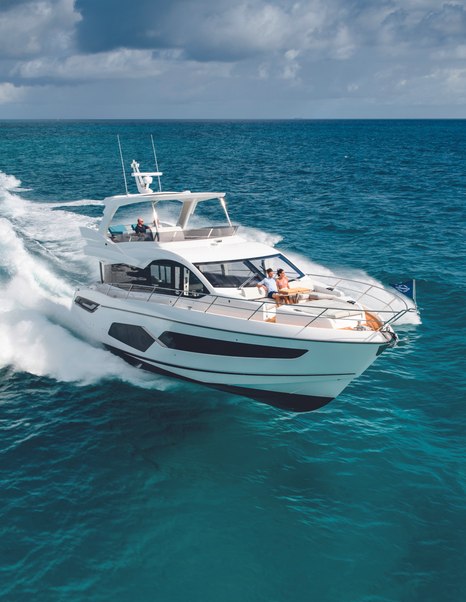


One significant update is the inclusion of Volvo Penta IPS1350 (1,000hp) pod drives alongside the standard MAN V8 1,000hp engines or optional 1,200hp shaft drives. This addition provides owners with smooth, intuitive joystick control as standard, offering enhanced manoeuvrability. While joystick control is available as an option for the shaft drive engines with the addition of a stern thruster, initial feedback suggests that most buyers are opting for shaft drives, potentially influenced by the 10% price increase for IPS.
Regardless of the powertrain chosen, the Manhattan 68 guarantees a top speed of 30-32 knots and responsive handling, with a practical cruising range of 20-26 knots, ensuring an enjoyable and efficient cruising experience.
Manhattan 66 Interior
While engine options present a straightforward choice, the interior alterations of the Manhattan 68 are far more intricate, offering a multitude of considerations for buyers.
On the surface, the new interior design of the 68 appears to be a significant enhancement. Compared to the 66, the standard layout now includes a separate dining area alongside the galley aft, while maintaining the same spaciousness and number of cabins. Achieving this layout involved relocating the private stairwell of the owner's stateroom from its original position near the salon doors to a new spot forward, accessible from the lounge area. This reconfiguration provides a more fluid and functional living space, enhancing the overall onboard experience for owners and guests alike.
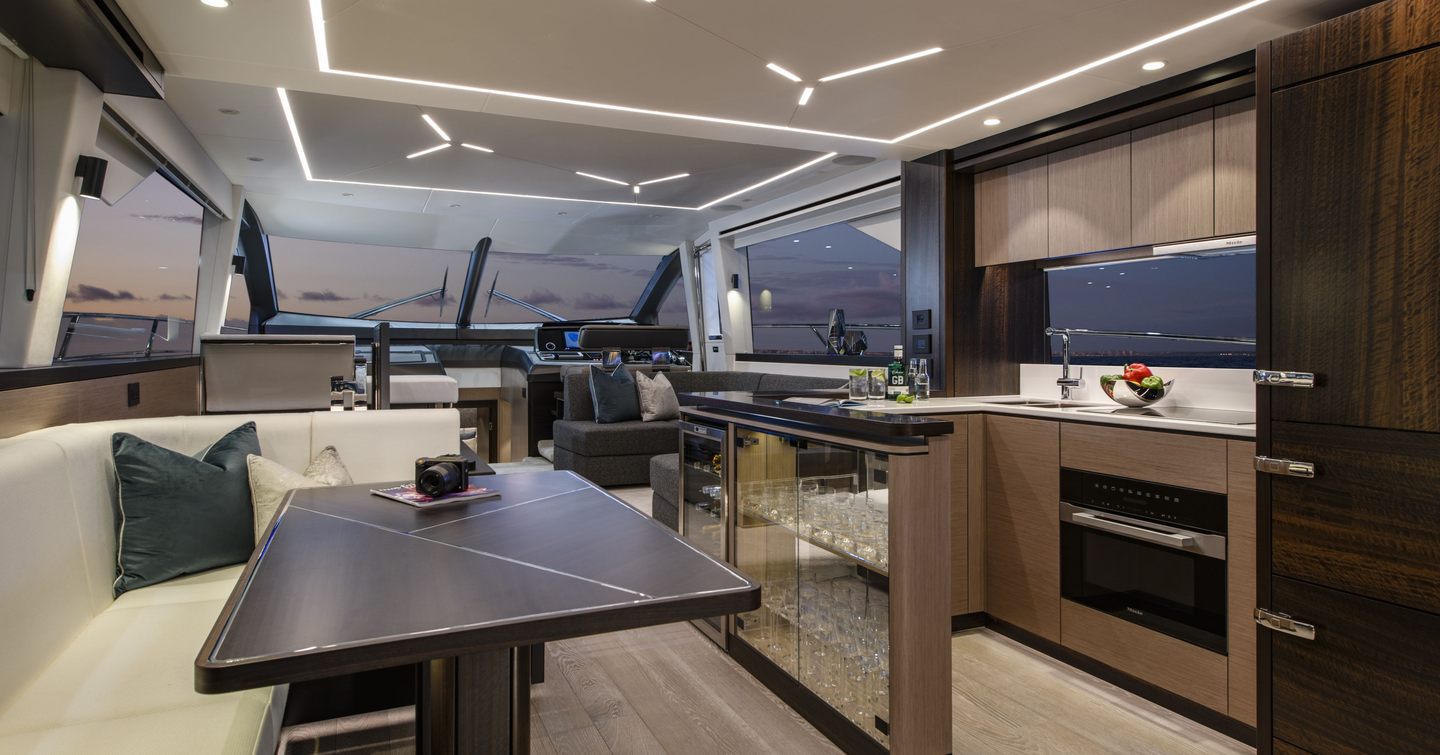
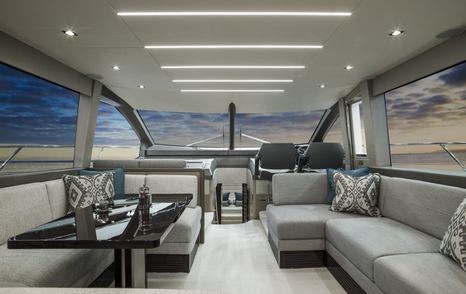

While the Manhattan 66 and 68 may appear largely indistinguishable from the outside, they boast different interior designs. A notable change from the 66 to the 68 is the shift of the aft owner's stairwell forward, resulting in alterations to the galley, salon, and owner's cabin layouts. This adjustment enhances the overall flow and functionality of the living spaces aboard the Manhattan 68, distinguishing it from its predecessor.
Except for the Pacific option, the standard below-decks floorplan maintains consistency from the Manhattan 66 to the 68. The three guest cabins forward retain their deep, spacious layout and exquisite appointments, welcoming guests with elegant doors and a sophisticated blend of materials and lighting. The two twin cabins offer remarkable comfort, enhanced by the abundant natural light streaming in through the expansive hull glass windows. These twin cabins share a well-appointed toilet and shower compartment, while the forward VIP boasts its ensuite bathroom and a charming dressing table, adding a touch of luxury to the accommodation experience.
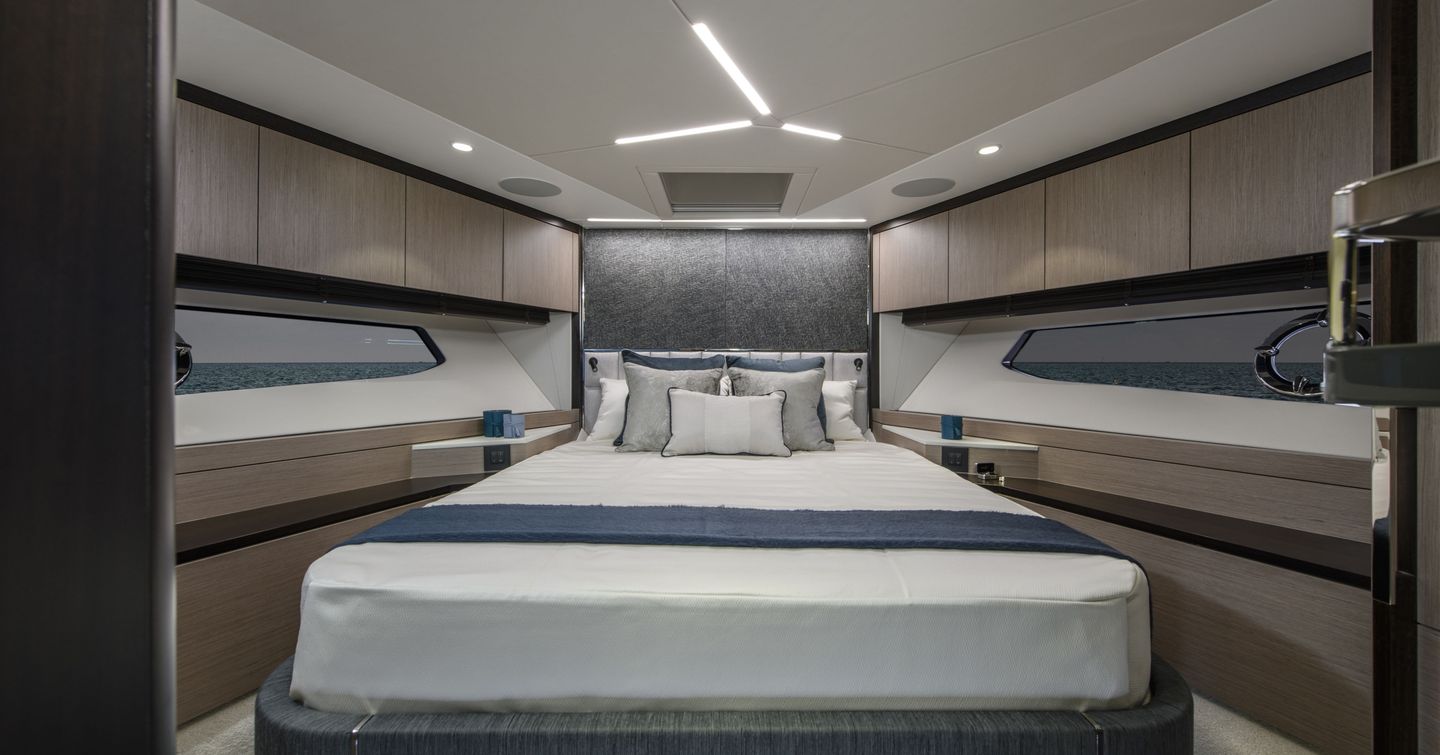
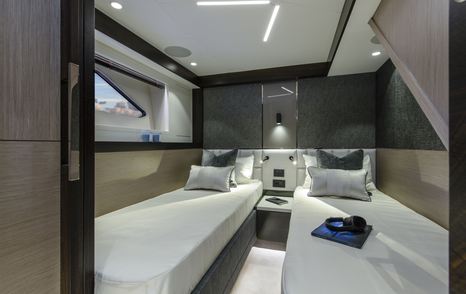

The inclusion of a private stateroom separating the guest quarters from the owner's area proves to be a highly effective layout, particularly for families with older children or charter yachts, creating distinct retreats for two families. However, this arrangement does come with a drawback. While it may seem ideal to separate parents from younger children, parents often prefer to remain available and connected to their younger kids.
This issue is not unique to Sunseeker, as many other flybridge yachts now offer similar private stateroom configurations. Nevertheless, we still appreciate the ingenuity of this design and owe thanks to the firsthand experience of an owner who highlighted this consideration.
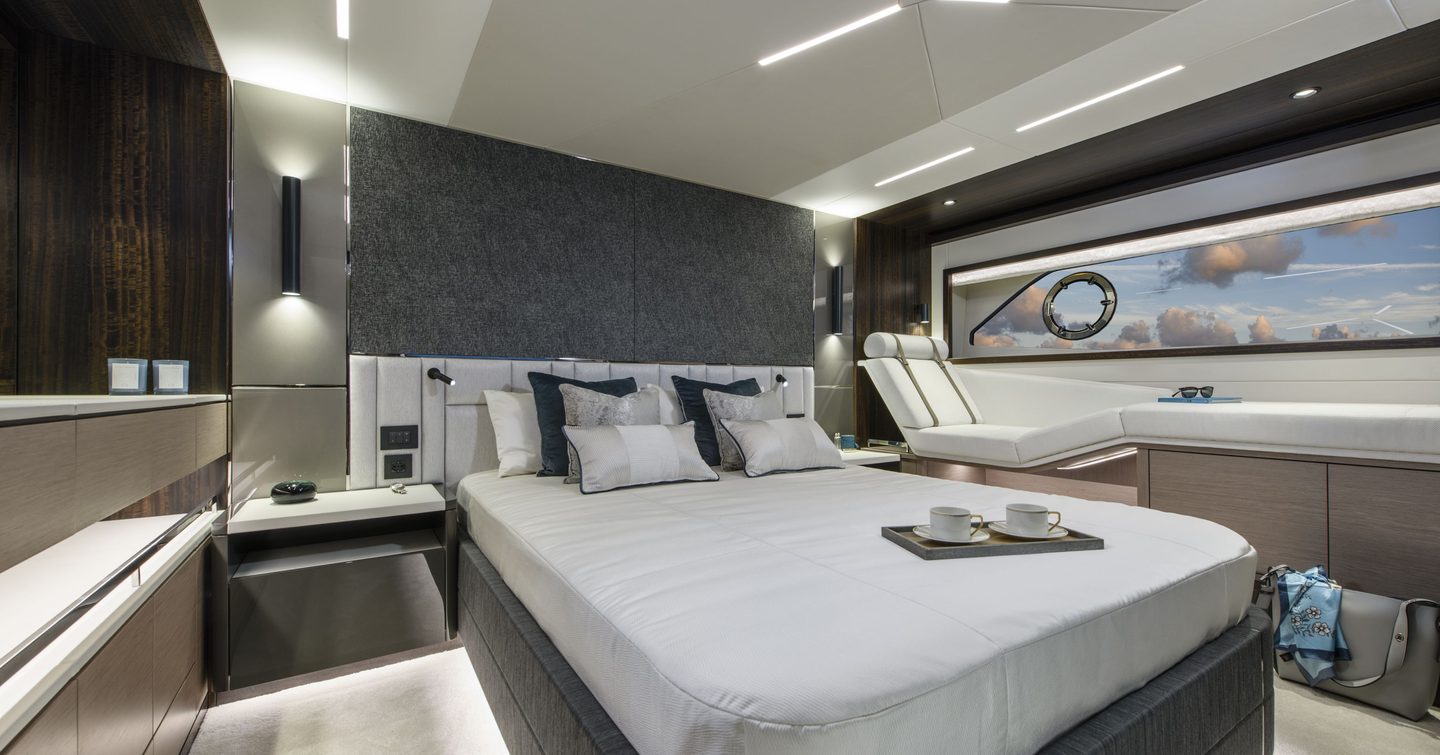
All Change?
Accessed via a wide and secure spiral staircase, the stateroom of the Manhattan 68 is preceded by two deep storage lockers. Upon entry, those familiar with the Manhattan 66's stateroom will notice both significant changes and remarkable consistency in design.
The layout of the 68's cabin mirrors that of the 66, with the berth now forward-facing and the ensuite positioned forward as well. To port, two tiers of cabinetry offer ample storage options, while the choice between club seating or a sofa adds versatility to the space. The only elements that remain unchanged are the two deep hull-side windows, though even these have been refined with a softened style and smart ports.
Despite the comprehensive overhaul, Sunseeker has skillfully ensured that no space is sacrificed while delivering an enhanced level of finish, maintaining the yacht's luxurious appeal.
Both the lower and flybridge helms of the Manhattan 68 boast twin multifunction display (MFD) screens and touch-screen controls for easy management of all onboard systems and data. The upper helm, with its twin seats, provides exceptional visibility as anticipated, while the lower helm offers an equally impressive experience. The forward and side screens of the lower helm afford a clear forward view, complemented by the deep salon windows that allow for easy viewing aft, ensuring optimal situational awareness from both helm stations.
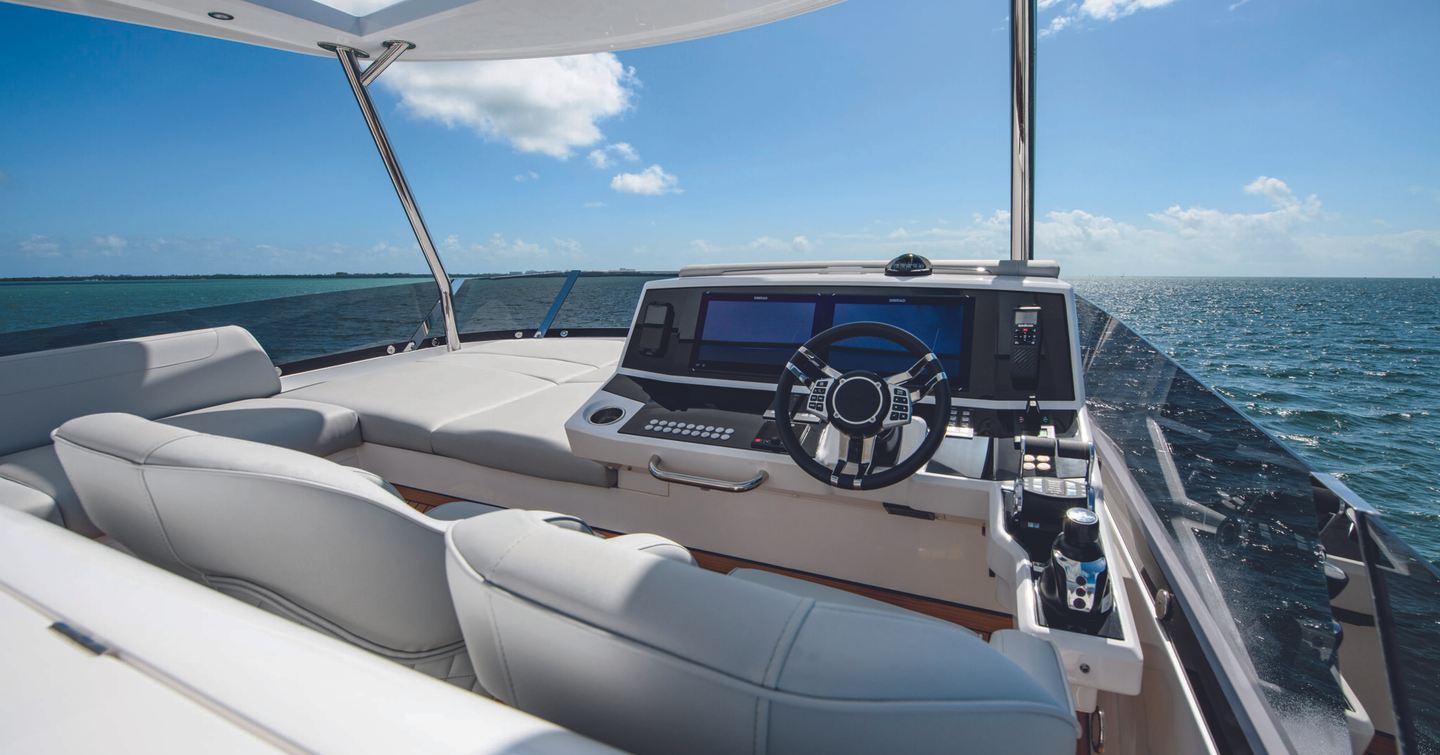


While the lower helm of the Manhattan 68 retains the narrow yet practical side deck door, a notable change is observed in the seating arrangement. Instead of the supportive twin helm seats, a single flip-up bench is now featured, a modification choice that remains unclear.
The Manhattan 68 exhibits the "same but different" effect between itself and the 66 most notably on deck. While sharing the same flybridge aft deck and foredeck layout, the 68 exudes a distinct and notably enhanced ambiance. This difference is a testament to the power of finish, with subtle refinements contributing to an overall improved experience onboard.
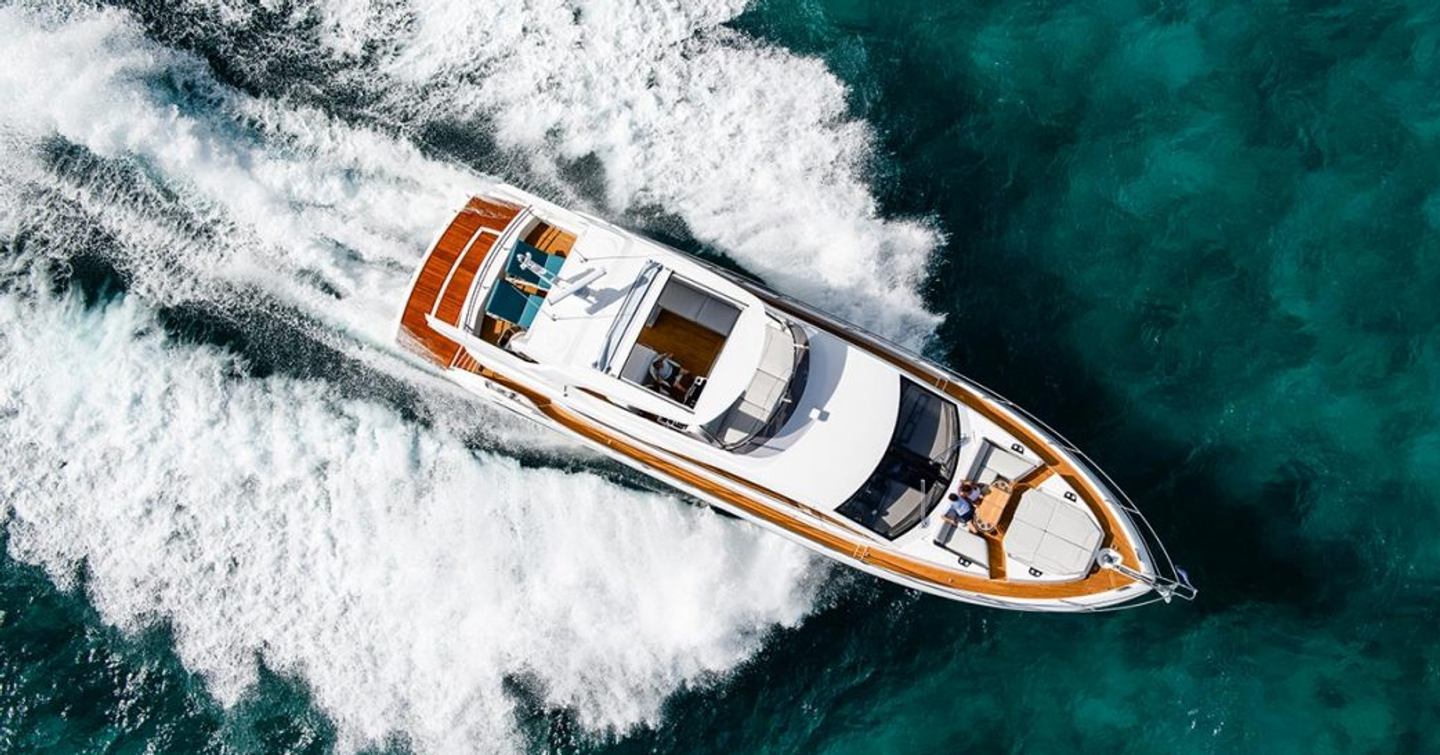
The flybridge serves as another example of the "same but different" approach between the 66 and 68. While elements such as the forward sunpad, wraparound seating, and aft lounge follow the design of the 66, subtle enhancements are evident on the 68. During our test of the yacht, we noticed that the upholstery was more refined, with the sunroof, hardtop, and pillars finished in a sophisticated graphite hue.
Additionally, the helm console's dash and the fixed aft seating featured elegant graphite accents, while the storage bases were cleverly cut away for added functionality. The final design of the aft deck offers flexibility for customization, with various seating options available or the option to leave it clear for free-standing loungers, allowing owners to tailor the space to their preferences.
Finishing Strongly
Throughout the decks, a general tidying up has been apparent. For instance, the aft flybridge backrest from the previous 66 model, which continued around the coaming unnecessarily, has been removed, resulting in a more spacious and clean deck area. A notable addition is the new wet bar, featuring a smaller design yet still accommodating a barbecue area with a fridge and icemaker below. Another standout feature, present both in the cockpit and on the flybridge, is the robust teak table with a flip-over top, which cleverly doubles as a thick grab rail, adding both functionality and aesthetic appeal to the space.
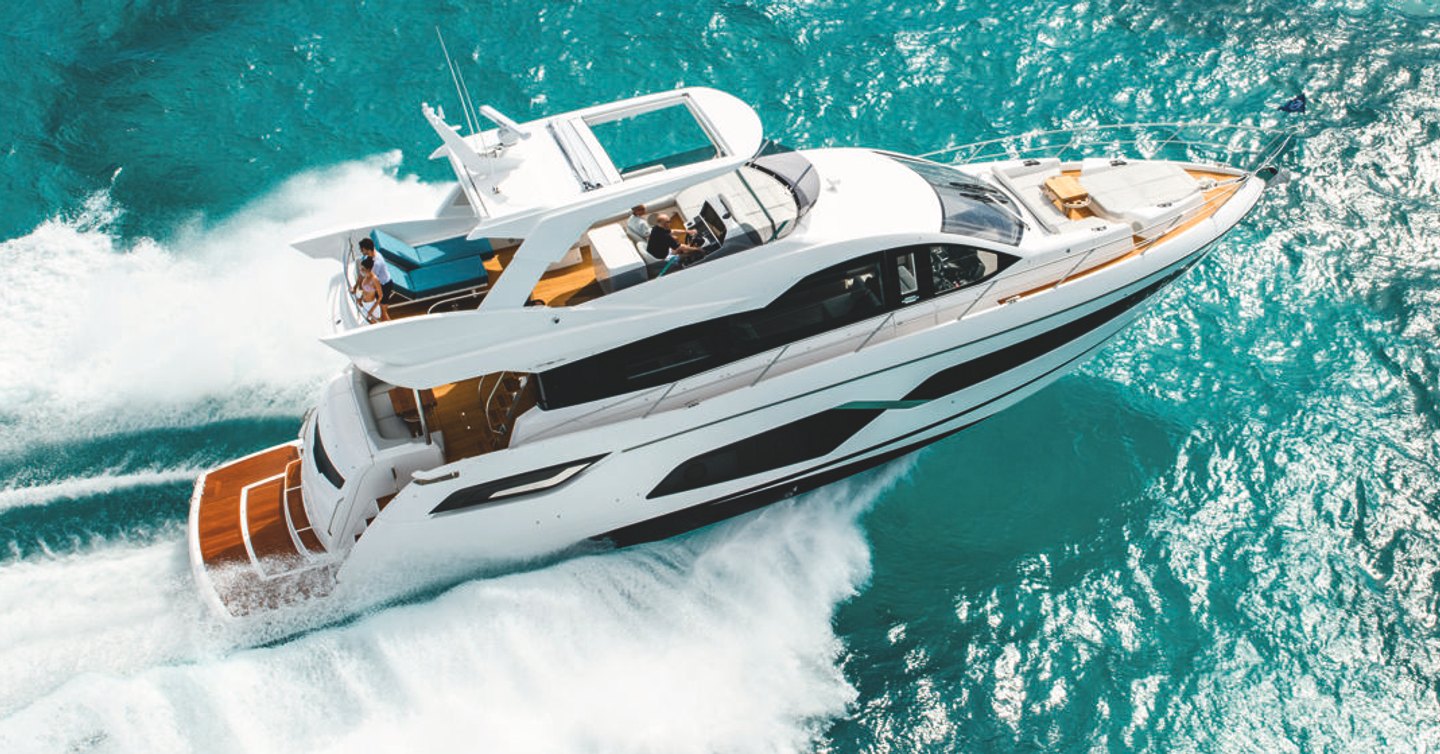


Descending the sturdy teak-padded stairwell, the aft deck transitions to the dining area, although the design precludes the inclusion of a galley bar area due to the entrance to the optional crew cabin occupying the space. While the side decks are deep and secure, it's worth noting the absence of bulwark gates. However, the raised mooring platforms, equipped with winches and cleats, remain consistent with previous models.
One standout feature is the foredeck lounge, which offers a dedicated and secluded area complete with seating, a teak table, a sun pad, and a pull-out canopy, providing both privacy and shade for guests to relax and enjoy the outdoors.
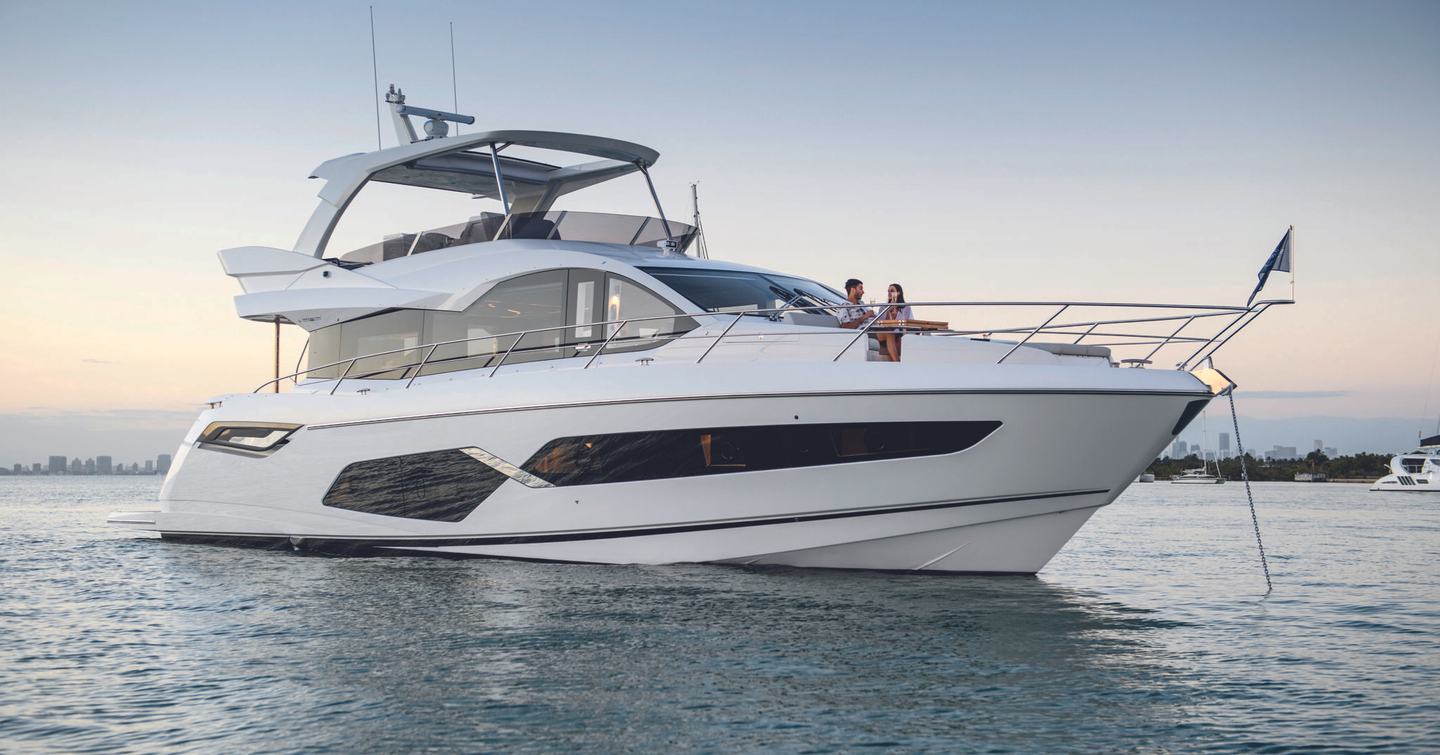
Deck stowage is well-appointed aboard the Manhattan 68, with deep lockers on both the foredeck and flybridge, while stern mooring points feature rope bins to maintain clear and organized high-traffic areas.
The hydraulic swim platform enhances storage capabilities with a sophisticated watersports locker concealed beneath the transom boot. This dedicated space provides storage for fenders, lines, and watersports gear, complemented by a convenient flip-up teak bench for ease of access or leisurely contemplation. For enthusiasts of SeaBobs, a waterline locker opens onto the sea when the swim platform is lowered, offering access to water activities.
Our Verdict
The Manhattan 68 improves on the already impressive 66 flybridge, enhancing several key areas including the interior finish and the flybridge layout. The addition of a permanent dining area is a notable improvement, although it does entail sacrificing some storage space. With its robust 30-knot performance and contemporary design featuring ample glass, the Manhattan 68 is yet another stylish and capable Sunseeker model suitable for both crew and owner-operation alike.
Reasons to Buy
- New salon design and stateroom access
- Separate dining area
- Strong 30-knot performance
- Impressive next-gen finish and options inside and on deck
- Private Owner's cabin
Things to Consider
- Reduced galley stowage
Looking to own a Sunseeker Manhattan 68? Use YachtBuyer’s Market Watch to compare all new and used Sunseeker Manhattan 68 Boats for sale worldwide. You can also order a new Sunseeker Manhattan 68, customized to your exact specifications, with options for engine choice and layout configuration. Alternatively, explore our global listings of new and used boats for sale and find your perfect boat today!
Rivals to Consider
In the fiercely competitive flybridge market, ranging from 40ft to 70ft, every inch counts as yachting giants vie for dominance. With a plethora of superb rivals, each new model faces stiff competition from a vast fleet of outstanding contenders. Among the big names in yachting, there are numerous examples of modern cruising designs that exude luxury and capability.
Sitting at the apex of the flybridge segment, the 70ft sector epitomizes power, capability, and luxury. Notable yachts in this category are expected to deliver an exceptional cruising experience. Our selected rivals all feature crew quarters, typically located in the stern with direct deck access, and boast four cabins, though three cabin options are also available. Performance-wise, most yachts achieve speeds of around 30 knots, with comparable on-the-water prices.
With both Italian and British shipyards competing in this market, we're witnessing a shift towards well-balanced designs that depart from the bulkier aesthetics of previous years. Instead, there's a new focus on slender exteriors that maximize space without compromising on style or functionality.
A fine example of this new sleek style is the Azimut 68, a breathtaking design by Alberto Mancini with a light, bright, and versatile interior and superyacht level decks loaded with smart luxury. The Fairline Squadron 68 is another such yacht, with various below-deck layouts that include a relaxed tri-cab option with a utility area.
The elegant Ferretti 670 is a great example of lateral thinking, its three-cabin layout creating a mezzanine study for the Owner’s stateroom, the overall layout feeling a more balanced and inspired option than the four-cabin.
The Princess Y72 is around 1ft 6in (0.5m) longer and, more importantly, a foot wider than the Sunseeker, its bright, relaxed interior reflecting the extra volume. The layout lacks the flexibility of other yachts here but that’s ok because it is one of the most considered and cohesive flybridge models on the water, packed with social lounges and thoughtful design.
Finally, the hotly anticipated Pearl 72 looks like a sensational yacht on paper. Giant-killer Pearl appears to have continued its knack of creating massive salons that stretch from cockpit to helm with multiple lounge areas. Below decks, the four-cabin layout includes two full staterooms with a full-beam cabin joined by a forward Owner’s suite accessed off a private stairwell. The standard main deck layout features an aft lounge and central dining and galley area. Some 2ft 5in longer and 1ft 6in wider in the beam, the Pearl 72’s competitive asking price and high specification will make it a hard yacht to beat.
Considering a new boat? Explore Sunseeker's entire current range to find the model that best suits your needs, and compare it with alternatives from competitors to ensure you make the perfect choice.
Specifications
- Builder Sunseeker
- Range Manhattan
- Model Manhattan 68
- Length Overall 21.21m
- Beam 5.26m
- Draft 1.6m
- Hull GRP
- Cabins 4
- Berths 8
- Crew 2
-
Cruising Speed
-
Max Speed
- Fuel Capacity 4,000 Litres
- Fresh Water Capacity 900 Litres
- Engine Model 2x MAN V8-1200
Interested in a Manhattan 68?
NEW Build
Find your local dealer for a personalised, no-cost consultation
or just request
Brochures & Pricing
Used & In Stock
Looking for a ready-to-go Manhattan 68 or pre-owned options? Explore all inventory of the Manhattan 68 available worldwide
